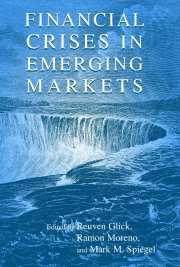Book contents
- Frontmatter
- Contents
- Preface
- Contributors
- 1 Financial Crises in Emerging Markets: An Introductory Overview
- PART I DETERMINANTS AND PROPAGATION OF FINANCIAL CRISES
- PART II CAPITAL FLOWS AND REVERSALS
- PART III INSTITUTIONAL FACTORS AND FINANCIAL STRUCTURE
- PART IV POLICY RESPONSES
- 10 Interest Rate Stabilization of Exchange Rates and Contagion in the Asian Crisis Countries
- Discussion
- 11 The Impact of Monetary Policy on Exchange Rates during Financial Crises
- Discussion
- 12 Capital Controls during Financial Crises: The Cases of Malaysia and Thailand
- Index
Discussion
Published online by Cambridge University Press: 04 August 2010
- Frontmatter
- Contents
- Preface
- Contributors
- 1 Financial Crises in Emerging Markets: An Introductory Overview
- PART I DETERMINANTS AND PROPAGATION OF FINANCIAL CRISES
- PART II CAPITAL FLOWS AND REVERSALS
- PART III INSTITUTIONAL FACTORS AND FINANCIAL STRUCTURE
- PART IV POLICY RESPONSES
- 10 Interest Rate Stabilization of Exchange Rates and Contagion in the Asian Crisis Countries
- Discussion
- 11 The Impact of Monetary Policy on Exchange Rates during Financial Crises
- Discussion
- 12 Capital Controls during Financial Crises: The Cases of Malaysia and Thailand
- Index
Summary
This chapter addresses an important topic, and it does so in a very appropriate way. The question how monetary policy affects exchange rates is essential for policy advice in any open economy, and it is absolutely crucial in a financial crisis. Different economic theories provide contradicting answers, however, creating a need for empirical evidence. The empirical focus of Gould and Kamin's chapter is therefore very appropriate. As usual with empirical work, I have concerns with how it is done and how it should be interpreted, but I like the chapter for what it does. It takes a good look at the data, as imperfect as they are, and it extracts some relevant lessons.
My comments focus on three issues: the motivation, the theoretical framework, and the empirical results.
MOTIVATION
The motivation of the chapter is excellent. The authors contrast two theories with radically different implications: “orthodox” (my label) and “revisionist” (their label). By orthodox theory I mean the textbook view that underlies the usual policy advice from the IMF and others: To limit or reverse a depreciation, the government should tighten monetary policy because this makes the domestic currency more attractive to international investors. The revisionist objection is that in a crisis, tight money can be so harmful to the real economy that it reduces the demand for domestic currency, creates risk premiums, and therefore triggers further devaluations. The theoretical controversy suggests that the issue is empirical: What is the impact of tight monetary policy on the exchange rate?
Information
- Type
- Chapter
- Information
- Financial Crises in Emerging Markets , pp. 421 - 426Publisher: Cambridge University PressPrint publication year: 2001
